 Rome Campus
Rome Campus
Behavioral Interventions for DGBI Conditions of the Upper GI Tract
Cognitive-Behavioral Therapy for Avoidant/Restrictive Food Intake Disorder (ARFID) - 2 CE Credits
Hypnosis Techniques in Psychogastroenterology - 3 CE Credits
GI Physiology for the Behavioral Health Provider - 1.5 CE Credits
Grand Rounds: The 3 step approach to Integrated Psychosocial Care in DGB
Grand Rounds: Abdominal Bloating and Distension
Grand Rounds: Abuse, Trauma, and Illness: What is the link?
Grand Rounds: Communication Skills
Grand Rounds: Sociocultural aspects of the assessment and treatment of patients with DGBI
Grand Rounds: ACG vs AGA IBS Guidelines and Clinical Application
Grand Rounds: Post Covid-19 DGBI
Grand Rounds: Deep Dive Into Central Neuromodulators
Grand Rounds: DGBI in Pediatric Populations
Grand Rounds: Gastroparesis vs FD
Grand Rounds: History of Disorders of Gut-Brain Interaction - DGBI (Functional GI Disorders)
Grand Rounds: DGBI Overlapping with Organic Disease
Rome Foundation Virtual Pediatric Symposium - 0 CE Credits
2023 Pediatric Symposium: Hot Topics in Pediatric DGBI
POC: The 3 step approach to Integrated Psychosocial Care in DGB
Grand Rounds: The 3 step approach to Integrated Psychosocial Care in DGB
Grand Rounds: Abdominal Bloating and Distension
Grand Rounds: Abuse, Trauma, and Illness: What is the link?
Grand Rounds: Communication Skills
Grand Rounds: Sociocultural aspects of the assessment and treatment of patients with DGBI
Grand Rounds: ACG vs AGA IBS Guidelines and Clinical Application
Grand Rounds: Post Covid-19 DGBI
Grand Rounds: Deep Dive Into Central Neuromodulators
Grand Rounds: DGBI in Pediatric Populations
Grand Rounds: Gastroparesis vs FD
Grand Rounds: History of Disorders of Gut-Brain Interaction - DGBI (Functional GI Disorders)
ALL CME PROGRAMS

Behavioral Interventions for DGBI Conditions of the Upper GI Tract
A Rome Foundation Continuing Medical Education program
Psychological and behavioral factors play a key role in developing and maintaining DGBI conditions, including disorders of the upper GI tract. Several complex upper GI disorders can be effectively treated with behavioral interventions delivered by multidisciplinary care team members, including psychologists and speech-language pathologists. In a practical and engaging lecture series, leading experts in psychogastroenterology will discuss the anatomy and physiology of the upper GI tract and behavioral techniques to treat belching disorders, rumination syndrome, and gastroesophageal reflux. Each seminar will include a didactic presentation, an overview of the condition being treated, the rationale for behavioral intervention, and the scientific basis for the approach. The program will draw upon current research findings as well as the presenters’ clinical expertise.
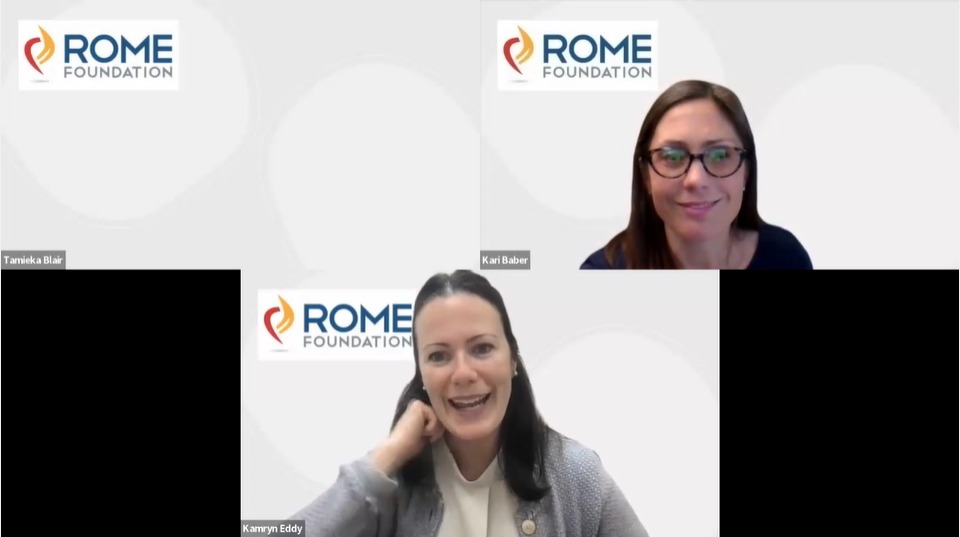
Cognitive-Behavioral Therapy for Avoidant/Restrictive Food Intake Disorder (ARFID) - 2 CE Credits
Individuals with chronic gastrointestinal (GI) conditions are at higher risk for developing Avoidant/Restrictive Food Intake Disorder (ARFID)– particularly individuals with DGBIs and dietary-treated conditions. Co-occurring ARFID can have significant health and psychosocial consequences and impact GI condition management. This in-depth workshop will provide Gastropsych clinicians with up-to-date education on ARFID prevalence in GI conditions, diagnostic criteria, and evidence-based treatment strategies, with a particular focus on the use of cognitive-behavioral therapy for ARFID. This program will benefit the multidisciplinary team of GI clinicians that care for individuals with chronic GI conditions (e.g., dietitians, advance practice providers, gastroenterologists) in addition to GI mental health clinicians.
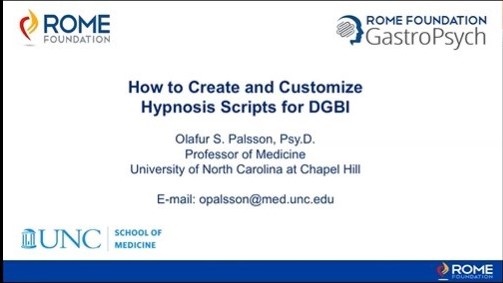
Hypnosis Techniques in Psychogastroenterology - 3 CE Credits
Learn about the emerging field of psychogastroenterology and how brain-gut psychotherapies, such as gut-directed hypnotherapy can improve outcomes and quality of life for many patients with chronic GI disorders.
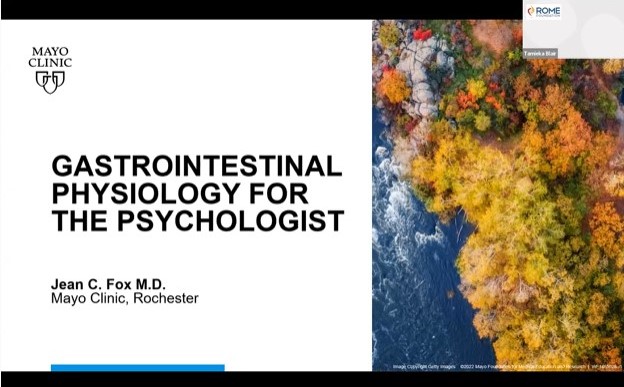
GI Physiology for the Behavioral Health Provider - 1.5 CE Credits
By the end of this session, participants will be able to:
● Describe and be able to explain to patients the path of digestion from the mouth to the anus, including the role of the esophagus, stomach, intestines, as well as the role of the liver, pancreas and gall bladder.
● Identify a minimum of 3 common digestive disorders and their etiology.
● Effectively explain the dynamics of defecation to patients, and the potential impact of trauma.
● List lifestyle factors and behaviors that can contribute to digestive disruption.

An introduction to Acceptance and Commitment Therapy for Disorders of Gut-Brain Interaction (DGBI) - 7 CE Credits
Acceptance and Commitment Therapy (ACT) is an emerging transdiagnostic psychotherapeutic approach for the treatment of long-term chronic conditions, including Disorders of Gut-Brain Interaction (DGBI), such as Irritable Bowel Syndrome or Inflammatory Bowel Diseases. Using an experiential approach, this session intends to introduce practitioners to the ACT model of case conceptualization in DGBIs. Further to that, a brief description of the model of intervention will also be provided, alongside some brief ACT consistent practices that can be easily incorporated into current patient management.

Grand Rounds: The 3 step approach to Integrated Psychosocial Care in DGB
Objectives for this Grand Rounds include:
|
Presented by:
Laurie Keefer, PhD, RFF
Professor of Medicine and Psychiatry
Icahn School of Medicine at Mount Sinai
New York, NY, USA

Grand Rounds: Abdominal Bloating and Distension
This Rome Foundation Grand Rounds presentation will appeal to individuals interested in evaluating and treating one of the most prevalent cluster of gastrointestinal symptoms – gas and bloating. These symptoms develop for a variety of different reasons. They are reported by a large number of patients with disorders of gut-brain interaction, such as irritable bowel syndrome and functional dyspepsia. The cause can be elusive; the pathophysiology is complex. The speaker will provide his perspective on this disorder, based on his clinical experience treating patients with these symptoms and research in the field.
Objectives for this Grand Rounds include:
● Review the epidemiology of abdominal bloating and distension
● Appreciate the complex pathophysiology of bloating and distension
● Recognize available treatment options
Speaker:
Brian E. Lacy, MD, PhD, FACG, RFF
Professor of Medicine & Senior Associate Consultant
Mayo Clinic, Jacksonville, FL, USA
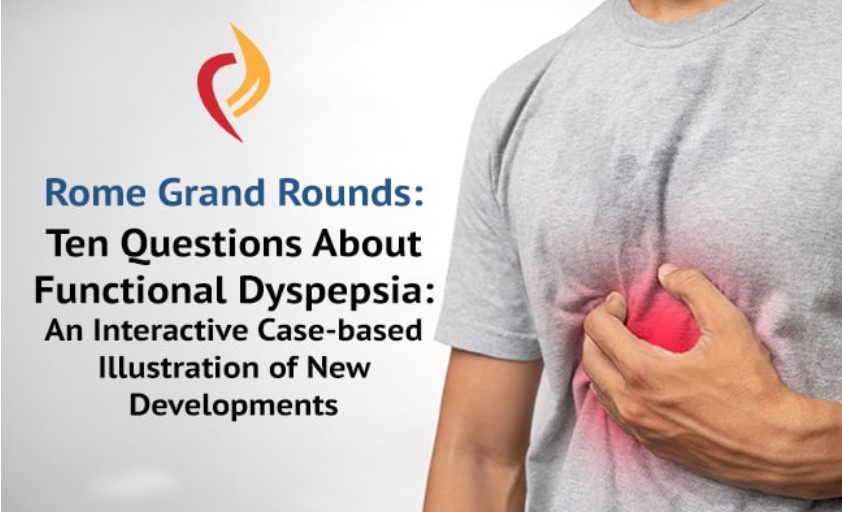
Grand Rounds: Ten Questions About Functional Dyspepsia (An Interactive Case-based Illustration of New Developments)
Functional dyspepsia is one of the most common and challenging conditions in clinical practice. The last few years have seen major evolutions in the understanding of the disease, its underlying pathophysiology, and the available treatment options. The separation from gastroparesis is an ongoing topic of transatlantic and international debate.
This interactive program will use a case-based approach to reveal some of the current concepts, ongoing controversies, and new information that is likely to be presented at meetings and in the literature later this year.
The program will appeal to clinicians, medical providers, and researchers interested in understanding the complexity of upper gastrointestinal symptoms, their relationship to physiological events such as food intake, and the potential impact of novel pharmacological and dietary therapeutic interventions.
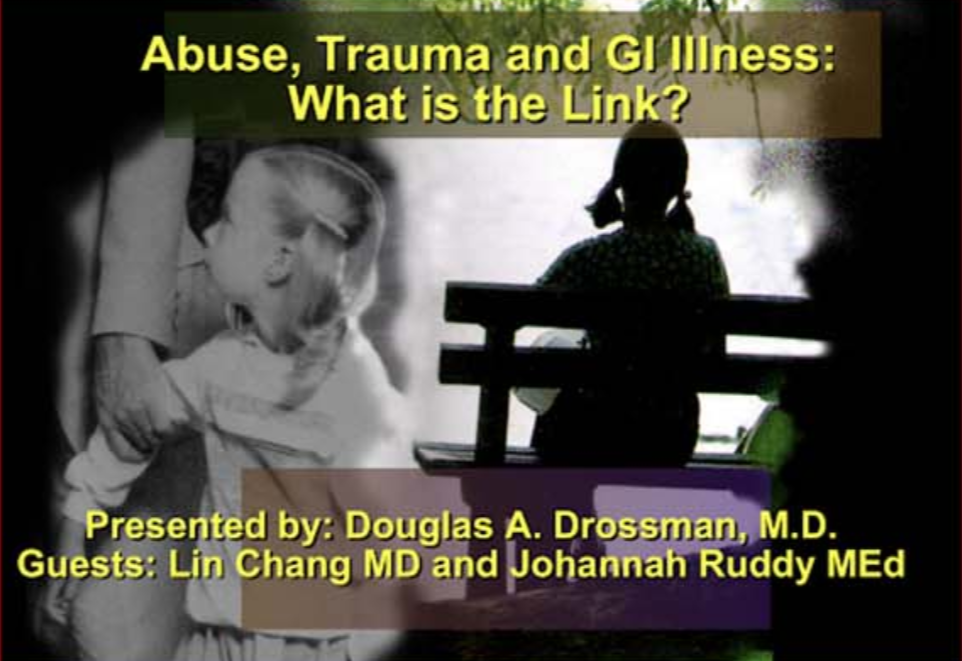
Grand Rounds: Abuse, Trauma, and Illness: What is the link?
A Rome Foundation Continuing Medical Education program
Presentation by Douglas A. Drossman, MD With special guests: Lin Chang MD & Johannah Ruddy MEd
This comprehensive program will appeal to individuals interested in unraveling the intricate interplay between abuse, trauma, and gastrointestinal illness.
Part 1 begins with a compelling case report by Dr. Drossman, recounting the journey of his adolescent patient who, having endured early trauma, developed gastrointestinal symptoms. This case spurred Dr. Drossman to pioneer the first study in the medical literature, elucidating this association.
Part 2, presented by Dr. Chang, offers an insightful research update, including her groundbreaking studies into the association between adverse childhood events and gastrointestinal illness, bringing us to the present day.
Part 3, presented by Ms. Ruddy, invites us into the realm of a patient’s experience.
Part 4 concludes the program as Dr. Drossman imparts his clinical experience and insights in caring for these patients to aid healthcare providers.

Grand Rounds: Communication Skills
Have you felt challenged when communicating with your patient or even frustrated that the visit just isn’t going well? Now you can learn Grand Rounds how to successfully navigate complex patient interactions, improving patient provider satisfaction and clinical outcome.
Douglas A. Drossman, MD, a recognized authority in DGBI and communication strategies, will present tips and techniques for optimizing the patient-provider relationship through the medical interview.
Objectives:
●Learners will understand how to provide patient centered care and improve upon shared decision making.
● Learners will understand the importance of effective communication skills to navigate challenging clinical situations
● Learners will understand the impact of DGBI from the patient’s perspective and learn their role in reducing the stigma experience for patients with DGBI

Grand Rounds: Sociocultural aspects of the assessment and treatment of patients with DGBI
A Rome Foundation Continuing Medical Education program Awareness and understanding of the sociocultural background of patients with DGBI can help avoid pitfalls and enhance the clinical outcome of patients with DGBI. The Multidimensional Clinical Profile (MDCP) approach, with unique case presentations, will be used to demonstrate how to navigate these complex issues in clinical practice.
Objectives:
● Recognize and assess the patient’s sociocultural background and its potential effect on the patient/HCP relationship and clinical outcome.
● Assess the effect of sociocultural factors on the patient’s “explanatorymodel of illness.”
● Recognize and bridge differences between the patient’s and the provider’s sociocultural backgrounds.
● Use the Multidimensional Clinical Profile (MDCP) approach to clinical practice including sociocultural influences.

Grand Rounds: Diet and DGBI
Introducing Rome Grand Rounds Session #4: Diet & DGBI
A virtual, interactive and intensive educational opportunity on topics related to Disorders of Gut-Brain Interaction (DGBI)
Each session will offer 1.25 CME credits and the opportunity to learn from the world’s best clinicians and researchers in the area of DGBI.
Objectives:
● Understand the role that food can play in symptom generation in patients with DGBI.
● Understand the impact that dietary therapies can play in symptom management
● Understand how the integrated care model, include dietary guidance, can improve clinical outcomes
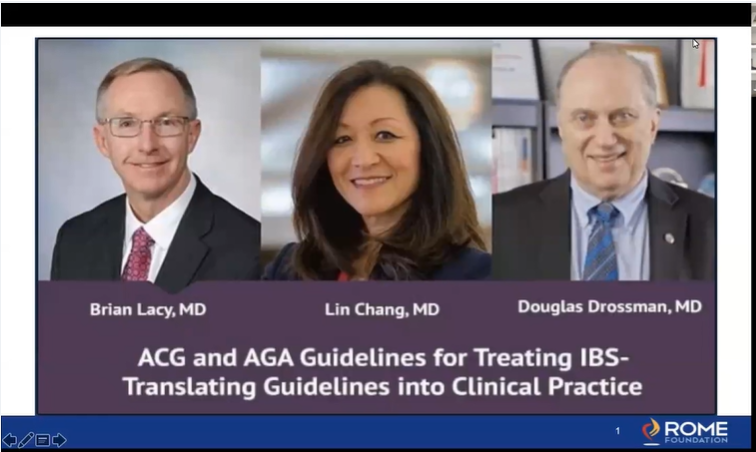
Grand Rounds: ACG vs AGA IBS Guidelines and Clinical Application
Objectives:
● Learners will understand the rationale for the IBS guidelines from the AGA and ACG
● Learners will understand how to adapt the guidelines to real world application to make appropriate diagnosis and treatment

Grand Rounds: Post Covid-19 DGBI
Introducing Rome Grand Rounds Session #7: Post Covid-19 DGBI
A virtual, interactive and intensive educational
opportunity on topics related to
Disorders of Gut-Brain Interaction (DGBI)
Each session will offer 1.25 CME credits and the
opportunity to learn from the world’s best clinicians and
researchers in the area of DGBI.
Objectives:
● To understand the mechanisms that explains the impact of SARS-CoV-2 in the GI tract.
● To understand the underlying pathophysiological mechanisms of the Post COVID-19 DGBI and learn the Diagnostic Criteria.”
● To learn the current studies that demonstrate the presence of Post COVID-19 DGBI.
● To review how the COVID-19 pandemic impacted in the practice of Neurogastroenterology especially in terms of Motility and DGBI.
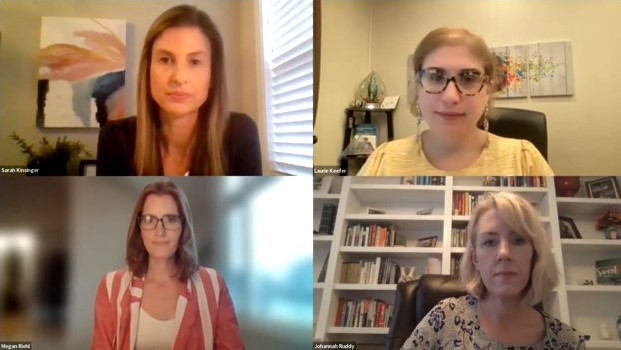
Grand Rounds: Evidence supporting Brain-Gut Behavioral Therapies (BGBT) and Integrated Care to Improve access through Mental Health
Objectives:
● Be able to explain the evidence supporting integrated behavioral care in DGBI.
● Identify a model of integrated behavioral care that would a) work in your practice tomorrow and b) could be implemented in your practice over the next two years
● Be able to explain the strengths and limitations of digital technology as part of integrated behavioral DGBI care
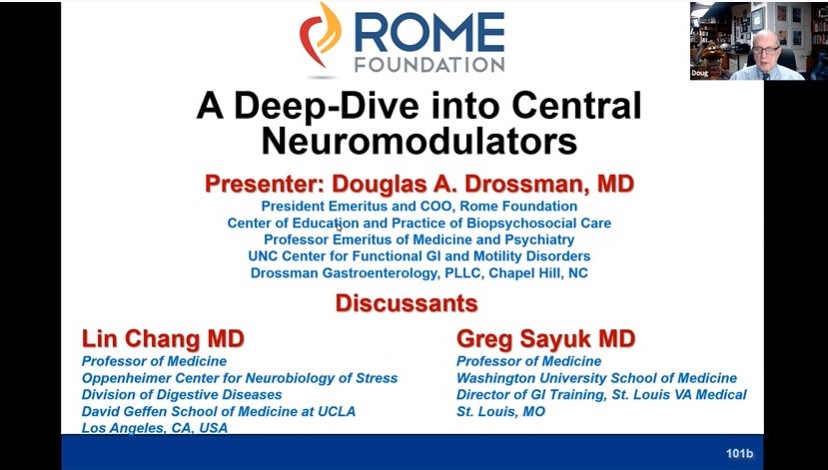
Grand Rounds: Deep Dive Into Central Neuromodulators
Objectives:
● Explained the pathophysiological basis for central neuromodulators in treating pain and other symptoms in patients with DGBI
● Determined treatment options for patients with DGBI symptoms, including abdominal pain

Grand Rounds: DGBI in Pediatric Populations
Objectives:
● Understand the pathophysiology of Pain Predominant Pediatric Disorders of Gut Brain Interaction (DGBI)
● Identify the utility for different treatments including non-pharmacologic and pharmacologic interventions
● Understand the multidisciplinary approach to the treatment of these patients

Grand Rounds: Gastroparesis vs FD
Objectives:
● To understand the pathophysiology of both Functional Dyspepsia with sub-categories and Gastroparesis
● To understand the overlapping mechanisms of both conditions, with and without nausea/vomiting
● To understand the recommendations for when/when not to use gastric emptying testing for diagnosis
● To understand the recommendations for treatment of both conditions
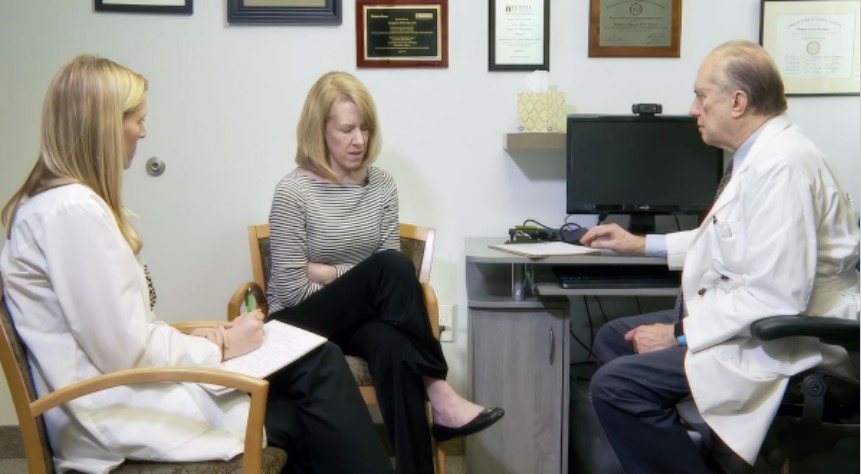
Grand Rounds: Initial Approach to a Patient with Severe Chronic Abdominal Pain: How to Engage, Educate and Achieve Collaborative Care
This module shows the interaction with Ms. Byers a simulated patient with multiple diagnoses including:
● Post-infection IBS
● Opioid-induced constipation
● Narcotic Bowel Syndrome
● Centrally mediated abdominal pain
● Psychosocial difficulties including
- History of abuse and trauma
- Somatic symptom disorder
- Visceral anxiety
- Depression
- Opioid seeking behavior
This module is designed to help the provider understand these disorders, engage with the patient in an effective patient-provider relationship, and use good communication skills to recommend effective treatments.
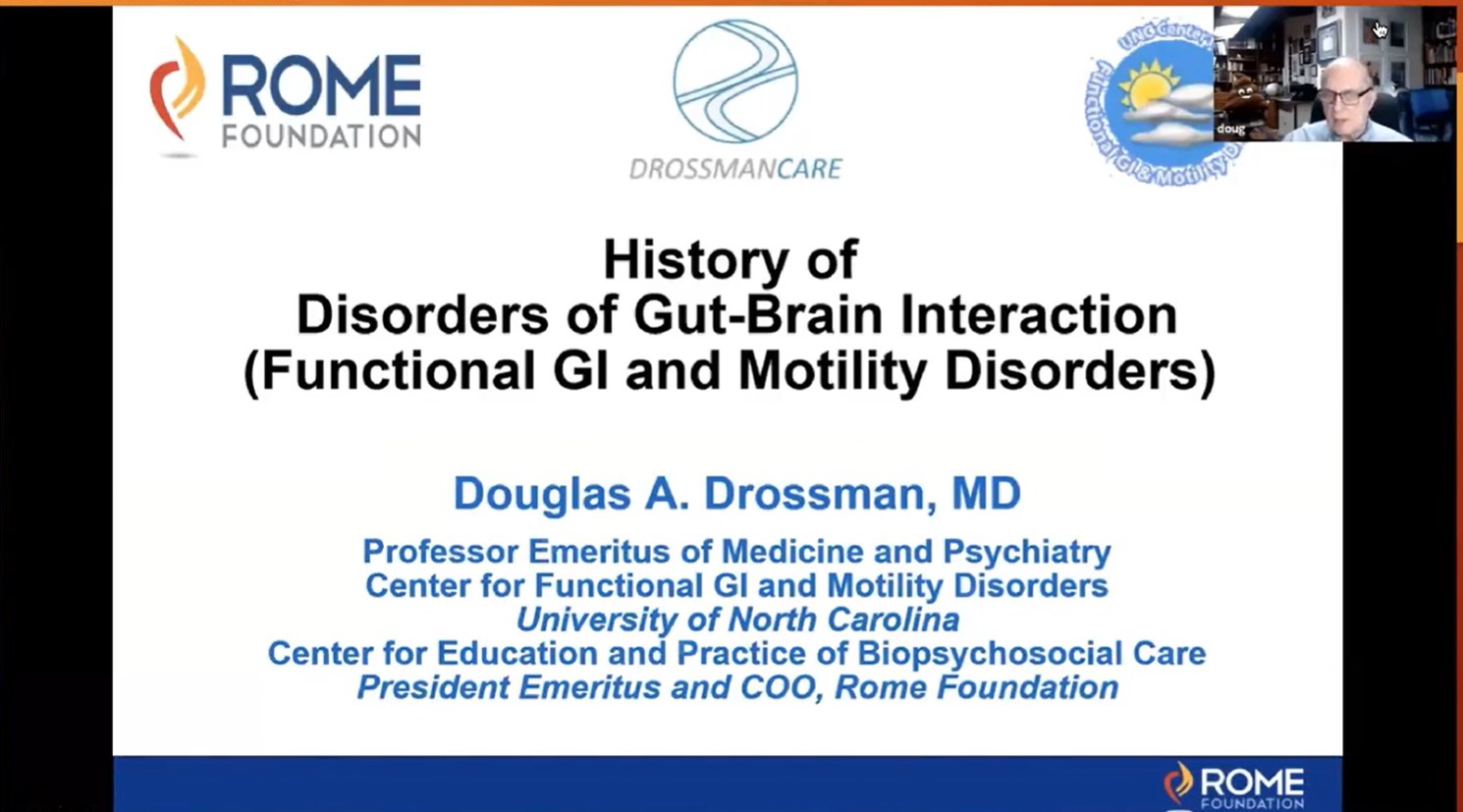
Grand Rounds: History of Disorders of Gut-Brain Interaction - DGBI (Functional GI Disorders)
This Grand Rounds features the original members of the Rome Foundation board who address the History of DGBI from the last millennia, to the present time. They also discuss the basis for the creation of the Rome Foundation.
Objectives:
● To understand the historical evolution of thinking about DGBI
● To understand the pathophysiological bases for DGBI
● Describe the historical evolution of thinking about DGBI
● Describe the pathophysiological bases for DGBI
● Trace the history of the formation of the Rome Foundation
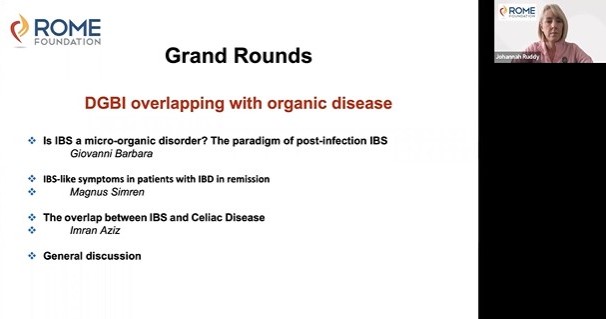
Grand Rounds: DGBI Overlapping with Organic Disease
Objectives:
● Describe the prevalence, GI symptom patterns and clinical impact of coexisting GI illnesses, assess potential geographic and demographic differences, and address how the presence of these symptoms relates to GI symptom patterns in specific DGBI.
● Provide guidance on how the presence of co-existing GI illnesses influences burden of the disease, clinical outcomes and patient management, including how to prioritize different treatment strategies.
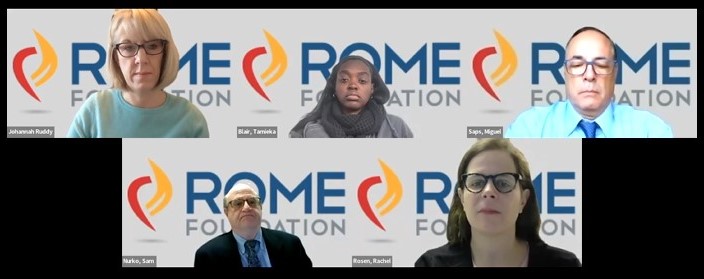
Rome Foundation Virtual Pediatric Symposium - 0 CE Credits
Learn how to manage pediatric Disorders of Gut-Brain Interaction: newborns through adolescents. This symposium will teach the process of evaluation, diagnosis and treatment. In addition we will bring in the complex nature of including the role of the family in management of pediatric patients with DGBI.
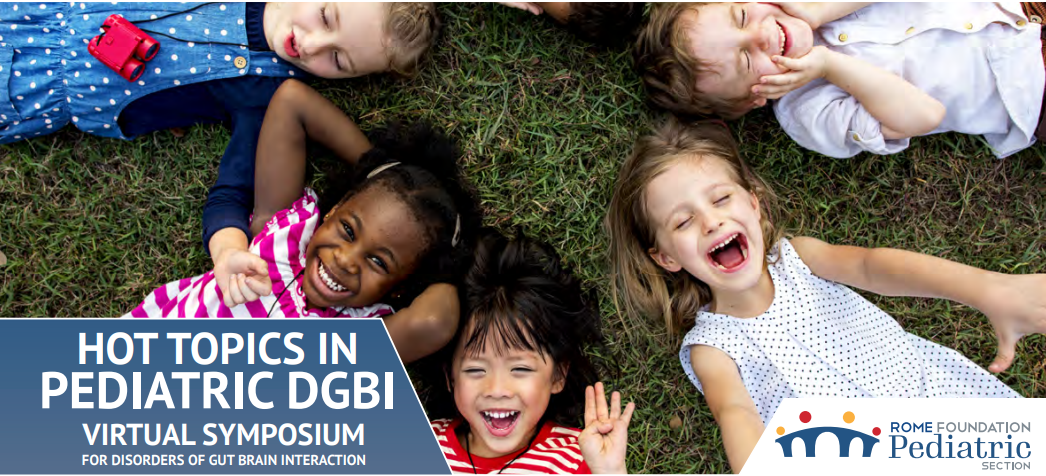
2023 Pediatric Symposium: Hot Topics in Pediatric DGBI
Learning Objectives:
● Using a case-based approach, to review evidence-based recommendations for the evaluation and management of children with DGBI
● To learn more about new and emerging DGBI diagnoses
● To feel more confident in handling controversial medical issues
• Test or not Test: Endoscopy, Imaging, Breath Testing, Impedance, Motility Testing
• Dietary Management: Chasing the Z score, Enteral Tubes, Specialized Diets
• Therapies: Behavioral / neuromodulators / neurostimulation / alternative
• Too Many Cooks in the Kitchen: The Role of the Gastroenterologist in Overlapping Pain Conditions and other diseases (MALS, MCAS, SFN,EDS, POTS, etc)
● From a multidisciplinary panel, to learn biopsychosocial management methods
The Rome Foundation Forums
The Rome Foundation forums are spaces where professionals can meet and discuss the clinical and scientific topics related to Disorders of Gut-Brain Interaction (DGBI).
- Discuss the clinical and scientific intersection of psychology and gastroenterology in the GastroPsych forum.
- In the Grand Rounds forum, professionals can meet and discuss the clinical and scientific topics related to Disorders of Gut-Brain Interaction (DGBI).
We value open, thoughtful, and respectful discussions. To maintain a supportive and productive environment, we ask all members to:
● Be Respectful: Treat others with kindness and professionalism. Disagreements are natural, but please focus on the ideas and not the individual. Avoid personal attacks, inflammatory remarks, or unprofessional behavior.
● Maintain Professionalism: This forum is about topics related to Disorders of Gut-Brain Interaction (DGBI). Keep discussions relevant, accurate, and based on scientific evidence when applicable.
● Be Supportive: We’re here to learn from each other. Offer constructive feedback and encouragement to foster a positive community.
● Respect Privacy: Do not share personal or patient information in any form. Uphold confidentiality and adhere to HIPAA and other relevant privacy laws.
By participating in this forum, you agree to abide by these guidelines. Let’s work together to create a respectful and enriching environment for everyone.
Thank you for your cooperation!

